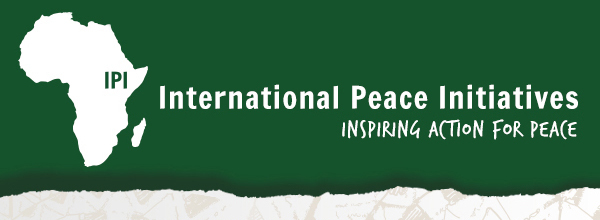
A Message from IPI-U.S. Board Chairman, Mike Beerntsen

Education, enterprise, and empowerment have always been central tenets of IPI’s mission. The work of international NGOs has become increasingly challenging in recent years due to global inflation and diminishing levels of international aid. In order to actively address these challenges, IPI-Kenya has enhanced their focus on their core principles by creating a homeschooling program. They have also launched several revenue-generating enterprises that are beneficial to the broader community in Kithoka. Your support of these initiatives will continue to help IPI-Kenya become more financially resilient and self-sustaining in the years ahead. Read on to discover how IPI is breaking into new and varied industries, including spa and beauty, organic farming, apiculture, and herbal products.
When you give, you help move IPI-Kenya toward a sustainable future!
Education: Building a Bright Future by: Nicole Alleyne, IPI Fellow

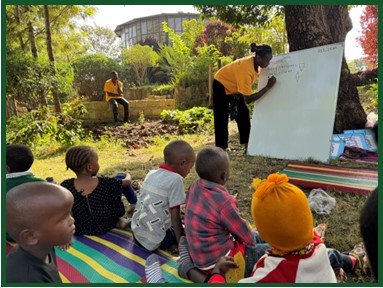 In January 2025, IPI-Kenya launched a homeschooling program for children of lower primary age whose educational needs weren’t being met at local schools. Each morning, Monday through Friday, 16 students arrive at Tiriji, ready to learn. The group is mixed, comprised predominantly of KACH kids and a handful of children from the local community. Student grade levels range from preschool to third grade. Three teachers facilitate instruction, with frequent help from KACH’s recent high school graduates.
In January 2025, IPI-Kenya launched a homeschooling program for children of lower primary age whose educational needs weren’t being met at local schools. Each morning, Monday through Friday, 16 students arrive at Tiriji, ready to learn. The group is mixed, comprised predominantly of KACH kids and a handful of children from the local community. Student grade levels range from preschool to third grade. Three teachers facilitate instruction, with frequent help from KACH’s recent high school graduates.
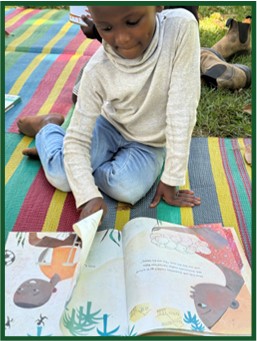 The homeschool program seeks to redefine our children’s learning experiences with a learner-centered model, reclaiming ancestral Kenyan roots. The homeschooling program employs the Kenyan national curriculum with the core subjects of Mathematics, English, Environmental, Kiswahili, Creative Arts, and Christian Religious Education. Our curriculum goes one step further, adding valuable cultural and social-emotional learning elements to instruction. Each step of the homeschooling program seeks to carry out Dr. Karambu’s vision of raising kind, curious, observant, self-aware, purpose-driven, and community-minded children.
The homeschool program seeks to redefine our children’s learning experiences with a learner-centered model, reclaiming ancestral Kenyan roots. The homeschooling program employs the Kenyan national curriculum with the core subjects of Mathematics, English, Environmental, Kiswahili, Creative Arts, and Christian Religious Education. Our curriculum goes one step further, adding valuable cultural and social-emotional learning elements to instruction. Each step of the homeschooling program seeks to carry out Dr. Karambu’s vision of raising kind, curious, observant, self-aware, purpose-driven, and community-minded children.
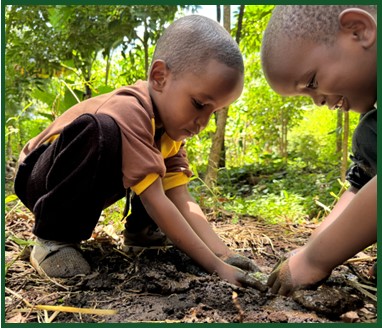 If you were to come to Tiriji, you would witness the lively morning scene of children watering the tree seedlings they each planted on the first day of school. You’d see them racing across the field to check the tomatoes, kale, and other crops they planted in their kitchen garden. Between Math, English, or Kiswahili classes, you might find the kids excitedly watching a bird create its nest or running through the trails looking for mangoes the wind generously knocked to the ground. You’d see us circled in a group, reading their favorite storybook series of fictional characters based on Kenyan culture. Or maybe you’d hear us singing songs in the native regional language, Kimeru. The day rarely ends without “forest time,” a free-play space held in the natural wooded areas of Tiriji. The magic happens among the trees: imaginary play, building and designing intricate structures with sticks and mud, making “mud chapatis” and “mud cakes.” Our children learn alongside nature, building relationships with the land as an integral part of their learning experiences. Current Needs: school supplies, extracurricular reading materials, food to provide daily lunches for the children. TOTAL: $1,500
If you were to come to Tiriji, you would witness the lively morning scene of children watering the tree seedlings they each planted on the first day of school. You’d see them racing across the field to check the tomatoes, kale, and other crops they planted in their kitchen garden. Between Math, English, or Kiswahili classes, you might find the kids excitedly watching a bird create its nest or running through the trails looking for mangoes the wind generously knocked to the ground. You’d see us circled in a group, reading their favorite storybook series of fictional characters based on Kenyan culture. Or maybe you’d hear us singing songs in the native regional language, Kimeru. The day rarely ends without “forest time,” a free-play space held in the natural wooded areas of Tiriji. The magic happens among the trees: imaginary play, building and designing intricate structures with sticks and mud, making “mud chapatis” and “mud cakes.” Our children learn alongside nature, building relationships with the land as an integral part of their learning experiences. Current Needs: school supplies, extracurricular reading materials, food to provide daily lunches for the children. TOTAL: $1,500
Please consider being an education partner as we launch our new school!
Enterprise: Building a Sustainable Future
by: Naomi Mwangi, IPI-Kenya Executive Director
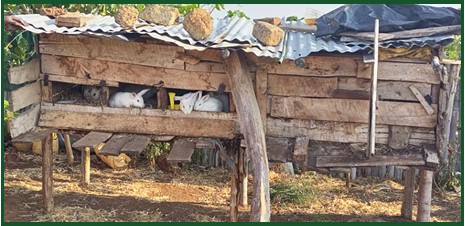
One of IPI’s long term goals is to create a sustainable system capable of supporting the Kithoka Amani Children’s Home. Some of the projects we have created that currently generate revenue include lodging at Tiriji for guests, a farm where we grow our own food, and animal husbandry. We currently have goats, chickens, pigs, and most recently, rabbits.
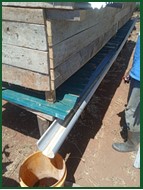 The rabbits project shows great potential for generating income as rabbit is not only a good source of protein, but rabbit urine is an effective soil fertilizer and natural insecticide. Rabbit urine naturally adds nitrogen, which is good for overall plant and leaf growth, and phosphorus and potassium that is beneficial for root development and plant health. Studies show rabbit urine not only increases yield but also the quality of the harvest. We have used it in our soil and have seen the difference in the crops we have grown. We are starting to harvest rabbit urine and packaging it to sell to farmers. We will also increase the number of rabbits we sell for meat. Current Needs: we need to build a better rabbit habitat to maximize the population, as well as harvest urine more efficiently. TOTAL: $1,800
The rabbits project shows great potential for generating income as rabbit is not only a good source of protein, but rabbit urine is an effective soil fertilizer and natural insecticide. Rabbit urine naturally adds nitrogen, which is good for overall plant and leaf growth, and phosphorus and potassium that is beneficial for root development and plant health. Studies show rabbit urine not only increases yield but also the quality of the harvest. We have used it in our soil and have seen the difference in the crops we have grown. We are starting to harvest rabbit urine and packaging it to sell to farmers. We will also increase the number of rabbits we sell for meat. Current Needs: we need to build a better rabbit habitat to maximize the population, as well as harvest urine more efficiently. TOTAL: $1,800
Our second project is the apiculture, or beekeeping project. We currently have 10 beehives, two of which have a colony of bees. We would like to develop this project to enable us to harvest and package not only the honey, but also bee venom, pollen, bees wax for making candles and lip balm, royal jelly, and propolis (used to build and maintain hives). Current Needs: miscellaneous supplies, beekeeping suits, gloves and smokers, honey extractors, refractometers, and warmers. TOTAL: $8,500
 Lastly, we have an herbs packaging project. We grow and dry the herbs at Tiriji and then sell them to guests and at our outlet at Makutano, a nearby shopping center. The herbs we grow include mint, rosemary, lemongrass, and wild basil. We dry and package these herbs and also use them to make natural soaps. Current Needs: drying tables, processing containers, packaging materials and labels. TOTAL: $2,100
Lastly, we have an herbs packaging project. We grow and dry the herbs at Tiriji and then sell them to guests and at our outlet at Makutano, a nearby shopping center. The herbs we grow include mint, rosemary, lemongrass, and wild basil. We dry and package these herbs and also use them to make natural soaps. Current Needs: drying tables, processing containers, packaging materials and labels. TOTAL: $2,100
Would you please partner with us on these new sustainability projects?
Empowerment: Building a Stronger Community
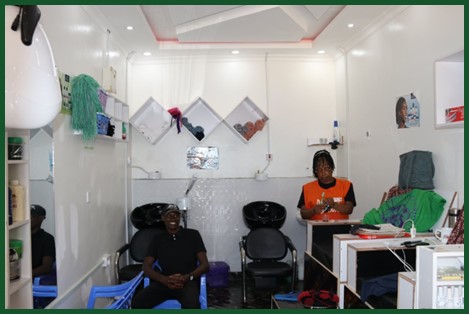 The Tiriji Spa has been operating for a full year, having opened in March 2024. Since that time, the spa serves approximately 100 individuals per month, employs two individuals and one-part time barber, and is not only a revenue-generating endeavor but most importantly, a social enterprise. IPI believes in lifting women out of poverty, and this business has helped many women be educated, trained, and empowered into starting their own businesses, thereby building a stronger community.
The Tiriji Spa has been operating for a full year, having opened in March 2024. Since that time, the spa serves approximately 100 individuals per month, employs two individuals and one-part time barber, and is not only a revenue-generating endeavor but most importantly, a social enterprise. IPI believes in lifting women out of poverty, and this business has helped many women be educated, trained, and empowered into starting their own businesses, thereby building a stronger community.
Like any new business, the startup costs can be overwhelming. Our manager, Felicity, has met those challenges head-on and has made the spa a success. Currently, the spa is generating enough income to cover salaries, utilities and materials at the spa. Surplus income has been used to provide for food and medical needs for our KACH kids! There are still needs to make this a fully-functioning sustainable business, however. Current Needs: barber chair, dryer chair, standalone dryer, pedicure basin, and other miscellaneous supplies. TOTAL: $2,000
Your support helps position IPI to be more sustainable! Thank you!
Asante Sana!
IPI-U.S. Board of Directors: Mike Beerntsen (Board Chair) Timothy Ehlinger (Immediate Past Chair), Fredah Rajab (Vice Chair), Angie Phetteplace (Treasurer, Ex-Officio), Eamon Aloyo (Director of ICSP), Michael Steinback, and Naitore Marangu
IPI-U.S. Advisory Board: Ralph Ogden and Nancy Martin Ross
IPI-U.S. is a registered 501(c)(3) nonprofit that supports IPI-Kenya, which manages all Kenyan operations. IPI envisions a world where violence, poverty and disease no longer exist and every individual lives in dignity and with integrity.
